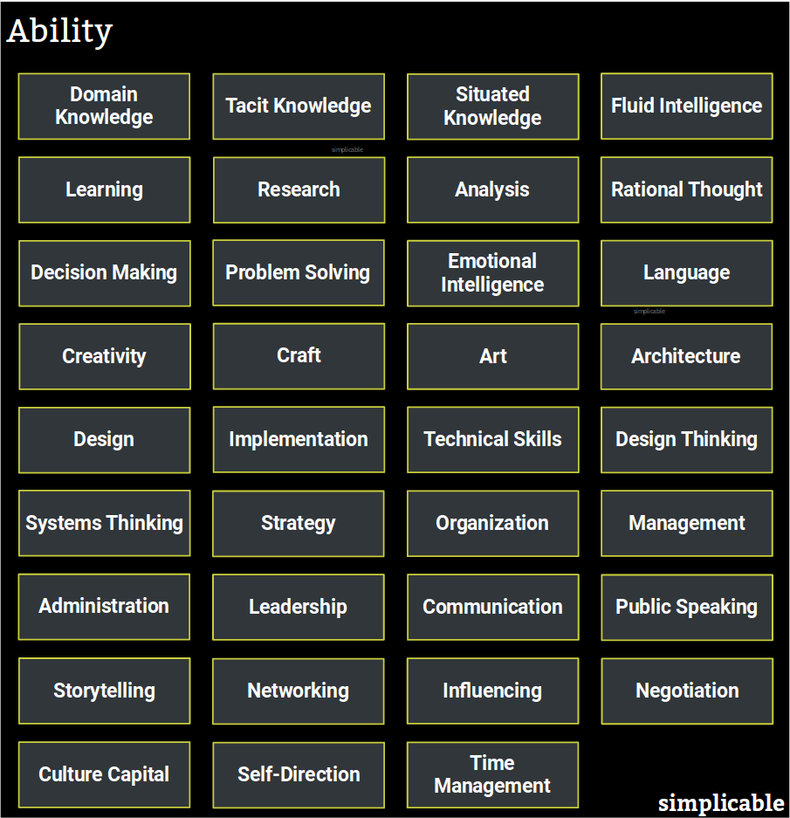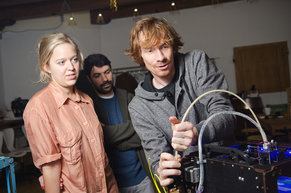

Domain Knowledge
Knowledge that is specific to a domain such as an industry, profession or field. For example, a pilot who knows how to safely land a jet on one engine.Tacit Knowledge
Skills that can only be obtained through direct experience such that they are difficult or impossible to learn from a book. For example, leadership or archery.
Situated Knowledge
Highly specific knowledge such as how to grow unusually large grapes on a particular hill with a unique terroir.Fluid Intelligence
Accomplishing novel tasks in areas where you have little preexisting knowledge. For example, an intern at a bank who develops a model for valuing solar panel manufacturing firms that is accepted by senior analysts as useful.Learning
The openness, curiosity and ability to acquire new knowledge such as a farmer who is able to apply organic farming techniques they learn from a neighbor.Research
Discovering knowledge, evaluating sources and conducting experiments. For example, an entrepreneur who develops reasonable estimates of a competitor's costs based on their public financial statements.
Analysis
The ability to organize, model and assess information. For example, a business analyst who collects and documents requirements for a system project.Rational Thought
The ability to develop arguments and ideas that reasonable peers would view as rational. For example, a student who gets high marks on essays due to their talent for developing an argument.Decision Making
The ability to make reasonable decisions in a timely manner.Problem Solving
Troubleshooting problems to find a solution. For example, an aircraft mechanic who quickly identifies the root cause of problems by leveraging their years of experience.Emotional Intelligence
The ability to navigate social situations by reading and using emotion. For example, a customer service representative who recognizes that an angry customer is feeling stressed and works to help the customer as opposed to taking the customer's negative demeanor personally.Language
Mastery of your native language and proficiency in second languages.Creativity
Generating useful ideas that are non-obvious such as an architect who develops a new way to transport natural light into the interior of a building.Craft
The ability to create things with your hands. For example, the ability to build prototypes of designs with wood to validate an idea.
Art
Artistic talent such as a skilled painter.Architecture
The design of structures such as buildings and infrastructure.Design
Design is a broad term for the creation of original work products. This includes visual design, product design, user interface design, interior design, information design, engineering and software design.Implementation
The ability to make designs a reality. For example, a software developer who can write the code required to implement a software design.Technical Skills
Know-how related to specific technologies at the user, administrator and developer level. For example, a salesperson who is good at using a sales force automation platform.Design Thinking
The ability to apply design to areas that aren't traditionally viewed as design problems. For example, a manager who uses design to improve team productivity and culture.Systems Thinking
The ability to think though the end-to-end impact of things to develop elegant solutions to complex problems. For example, a waste is food solution to an environmental issue.Strategy
Developing plans to achieve goals under competitive and constrained conditions. For example, a shoe company executive who develops a plan to allow customers to design their own customized shoes with an app.Organization
Orchestrating resources to achieve a plan. For example, a farmer who is able to secure the machines, facilities and labor required to harvest a crop in a timely and efficient manner.Management
The ability to direct people and control resources. For example, a team manager who controls a budget and manages the commitments and performance of a team.Administration
The interpretation and implementation of policy. For example, a chief information security officer who is able to realize a policy of proactively identifying vulnerabilities and applying preventative measures.Leadership
Getting people moving in the same direction to achieve goals such as a senior software developer who acts to unify the efforts of a development team.Communication
The ability to communicate information verbally and visually.Public Speaking
Communicating to a group such as a software engineer who is able to communicate the value of a software platform to developers at internal meetings and industry events.Storytelling
The ability to make information entertaining and engaging with storytelling techniques.Networking
The capacity to meet new people and maintain relationships to build professional and social connections.Influencing
Communicating to influence the actions and ideas of others. For example, a salesperson who is good at closing.Negotiation
Negotiating favorable agreements such as a purchasing manager who is good at negotiating prices and terms with suppliers.Cultural Capital
Cultural capital is the ability to influence in the context of a society and culture. For example, a film director who quickly earns the respect of film crews and actors due to their talent and personal presence.Self-Direction
Finding your own path to be productive in the face of uncertainty, distraction, competition, constraints and a lack of authority. For example, a project manager who is somehow able to deliver a project without much support from business units.Time Management
Making efficient use of time.Notes
There is a persistent and strange myth that the word ability implies an inborn talent that can't be acquired. This is not true as abilities can be developed and improved.| Overview: Ability | ||
Type | ||
Definition | The power to do things well. | |
Related Concepts | ||











































